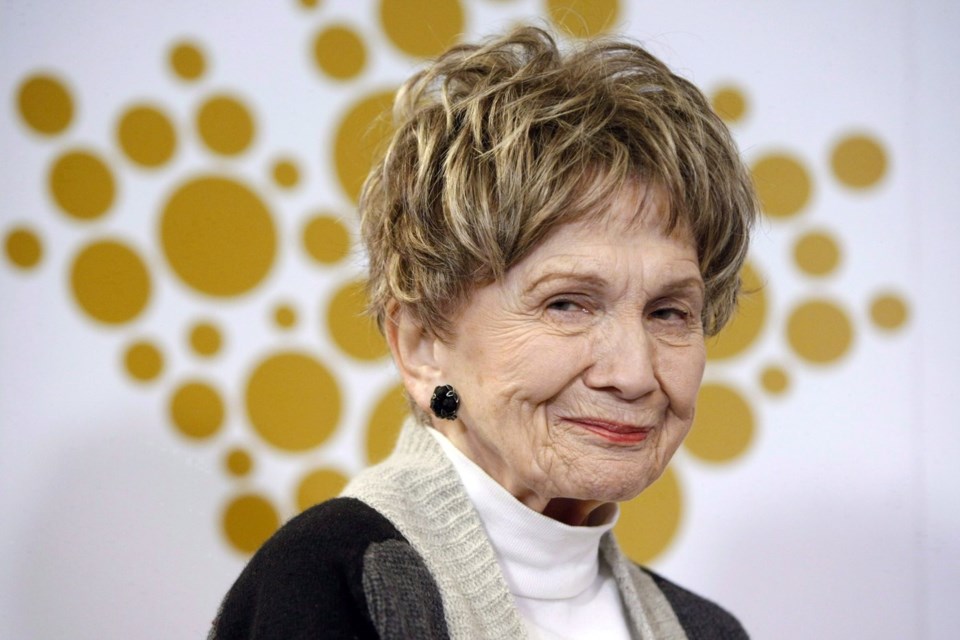The literary world is grappling with Alice Munro's legacy after learning that she chose to stay married to the man who sexually abused her daughter, with some saying it would fundamentally shift how — and whether — they read her work.
The Victoria bookstore founded by Munro and her first husband Jim Munro said it supports their youngest daughter Andrea Robin Skinner, who revealed in the Toronto Star on Sunday that her stepfather Gerald Fremlin's abuse stayed a family secret for decades.
"Along with so many readers and writers, we will need time to absorb this news and the impact it may have on the legacy of Alice Munro, whose work and ties to the store we have previously celebrated," Munro's Books, which is now independently owned, wrote in a statement on its website.
"It's been a very difficult time for everyone at the bookstore," managing partner Jessica Walker said at the store on Monday.
While some took strong stances — Globe and Mail columnist Marsha Lederman wrote that she would no longer read Munro's work and hoped reading lists and syllabuses would be reconsidered — others urged a more measured approach.
Clementine Morrigan, a writer whose work explores issues of trauma, childhood sexual abuse and incest, said there is a tendency to dissociate when these complicated topics arise.
"Either there's abuse and the person is a total monster who you could never love, or you love the person and so therefore there can't really have been abuse," she said in a video call.
"So what frustrates me so much in our responses when we find out that someone who is an important figure for us ... either perpetrated abuse or took part by inaction ... we actually repeat this pattern."
Instead, Morrigan said, readers can accept both things: that Munro was an immensely talented writer, and that she caused a great deal of pain for her daughter.
"I hate to see it playing out in this larger scale," she said. "I think the real challenge is that we actually have to be willing to hold both things together."
Skinner wrote in her essay that the abuse began when she was nine years old, and continued for several years. She said she confided in her stepbrother and that her father Jim Munro did not act after he was informed.
When she eventually told her mother about the abuse, Munro was callous, concerned more with how it affected her than her daughter's trauma, Skinner wrote.
Canadian author Michelle Dean wrote on social media that she wishes Skinner had been able to share her story widely sooner.
"Someone will surely eventually write the piece that worries we are cancelling Munro but I feel this revelation only enriches and deepens my understanding and relationship with her work," she posted on X.
Prolific American writer Joyce Carol Oates was among those recontextualizing Munro's work in light of the new information.
"If you have read Munro's fiction over years, you will see how often terrible men are valorized, forgiven, enabled," she wrote on social media Sunday. "There seems to be a sense of resignation, almost 'men will be men' attitude — not in all the stories but in some."
Munro biographer Robert Thacker told The Associated Press he was long aware of Skinner's abuse at the hands of Gerald Fremlin. His book “Alice Munro: Writing Her Lives” came out in 2005, the same year Fremlin pleaded guilty to a charge of indecent assault.
He said he omitted it from his book because it was a “scholarly analysis of her career."
“I expected there to be repercussions one day,” said Thacker, who added that he even spoke to the author about it. “I don’t want to get into details but it wrecked the family. It was devastating in lots of ways. And it was something that she spoke deeply on."
She also tackled the issue in her writing. He pointed to Munro stories "Silence" and “Runaway," which centre on estranged children. In “Vandals,” a woman grieves over the loss of a former boyfriend, Ladner, an unstable war veteran who the reader learns assaulted his young neighbour.
U.S. author Joyce Maynard, who wrote in a Facebook post that she is re-reading Munro's work this summer after the author's death in May, said Skinner's story is painful but should not be ignored.
Maynard said she was commenting as an admirer of Munro's work, and also "as a person who has experienced sexual manipulation and violation at the hands of a very powerful and revered writer."
Maynard wrote about her abusive relationship with the reclusive author J.D. Salinger in her memoir "At Home in the World." She moved in with him when she was 18 and he was 53.
In her post, Maynard said those who would try to discredit Skinner as seeking attention should consider the kind of backlash people often receive for speaking out.
Still, she said, she "will not cease to admire — and study — the work of Alice Munro."
-With files from The Associated Press and Dirk Meissner in Victoria.
This report by The Canadian Press was first published July 8, 2024.
Nicole Thompson, The Canadian Press




